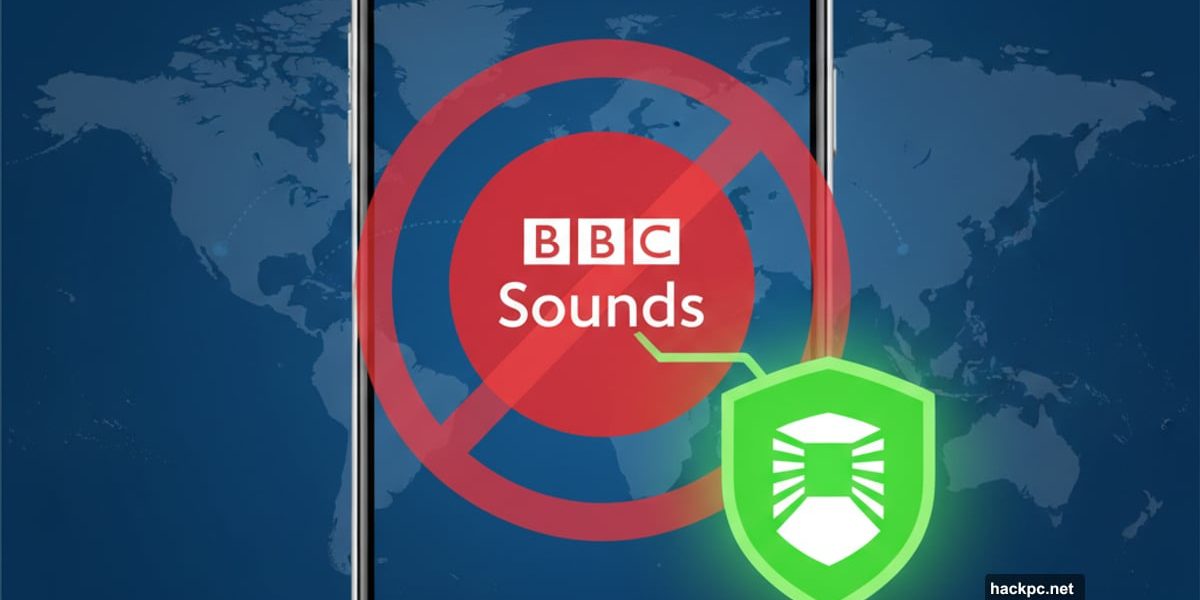
BBC Sounds went dark for international listeners on July 21st. No warning. No consultation. Just a sudden cutoff that left millions of Brits abroad without their favorite radio shows and podcasts.
But here’s the thing. You can still listen from anywhere in the world. Plus, the workaround takes less than five minutes to set up.
Let’s break down what happened and how to fix it.
The Block Hit Without Warning
Monday, July 21st changed everything for BBC Sounds users abroad. The corporation shut down international access to its podcast, radio and music app with zero advance notice.
So if you’re traveling, working abroad, or living outside the UK, you got locked out. Simple as that.
The BBC offered no real explanation. Andrea Catherwood, host of BBC Radio 4’s Feedback podcast, tried for weeks to get someone from BBC management on her show. Nobody would appear. Nobody would justify the decision.
Meanwhile, listeners lost access to everything. BBC Radio 6 Music. Desert Island Discs. The News Quiz. All the shows that made mornings bearable suddenly vanished.
VPNs Still Work Perfectly
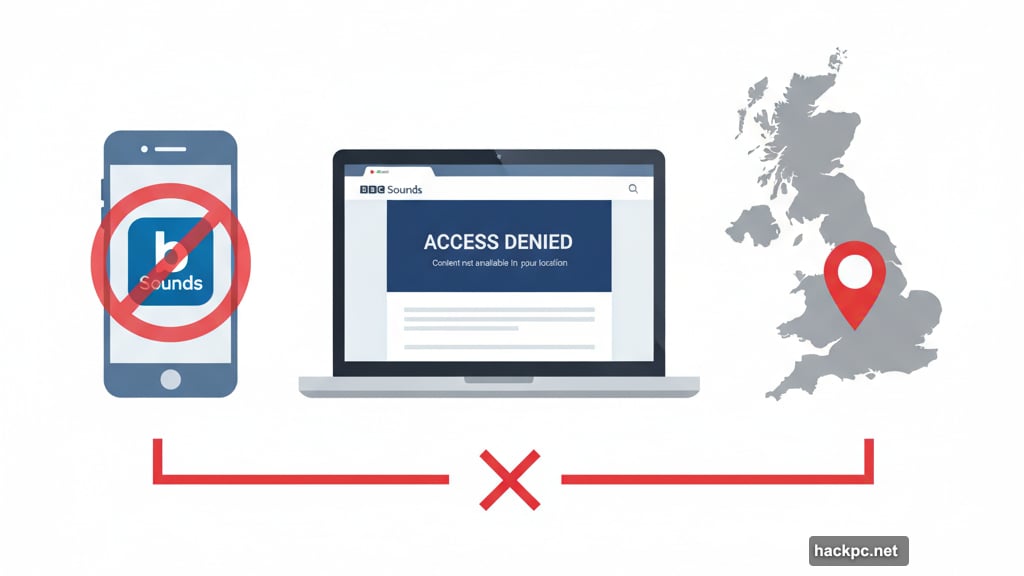
However, there’s a simple solution. A VPN lets you access BBC Sounds from anywhere on Earth.
VPNs work by making your device appear as if it’s back in the UK. The BBC’s blocking system can’t tell the difference. So you get full access to every show, podcast and live station.
NordVPN works best in our testing. It’s fast, reliable and unblocks BBC Sounds every single time. Plus, they’re currently offering 70% off with a 30-day money-back guarantee.
Here’s how to set it up. Download NordVPN on your phone or computer. Connect to a UK server. Open BBC Sounds. That’s it. You’re listening again.
Backup Options That Actually Work
Can’t use a VPN? There are workarounds, though they’re nowhere near as good.
First, you can access limited BBC content through BBC.com or the BBC mobile app. But here’s the catch. You only get BBC Radio 4 and the World Service live. Plus a handful of select podcasts.
No BBC Radio 6 Music. No 1Xtra. No local stations. The selection is painfully thin compared to BBC Sounds.
Second, you can visit individual radio station websites directly through your browser. BBC Radio 1, Radio 4 Extra, Asian Network and others all maintain separate websites that work internationally.
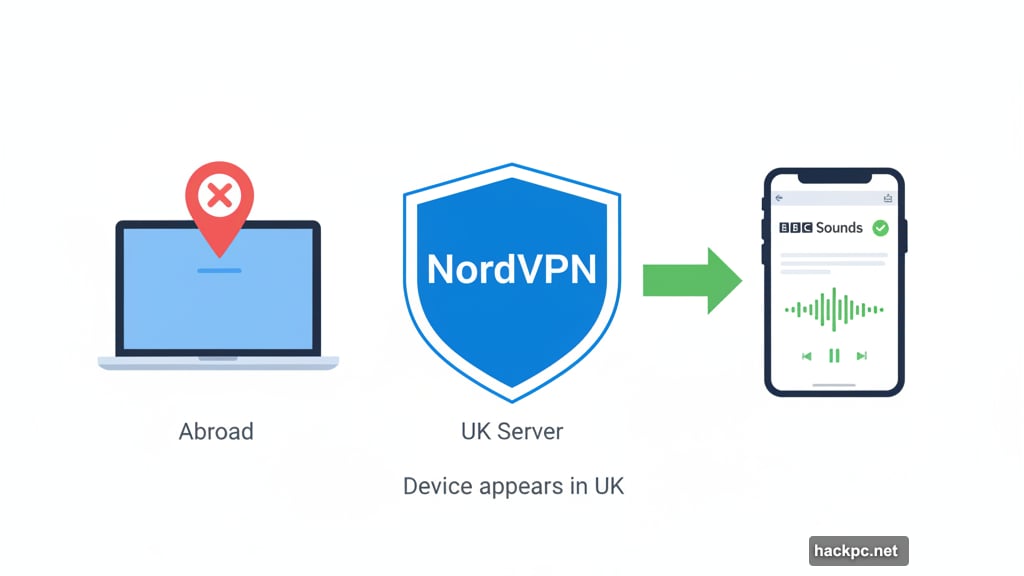
Yet these websites lack basic features. You can’t set a radio alarm. You can’t view full schedules. Most shows aren’t available on-demand. It’s functional but frustrating.
Make Sure Your Setup Works
Sometimes BBC Sounds blocks VPN users even with a connection active. Try these fixes if that happens.
Check your BBC account. It needs a valid UK postcode like W1A 1AA. The system verifies this automatically.
Change your phone’s region setting. The BBC Sounds app won’t appear in app stores outside the UK. But switching your device region to United Kingdom sometimes solves this problem.
Contact your VPN’s support team if nothing works. BBC constantly updates its blocking technology. So a server that worked yesterday might fail today. Support teams know which servers currently work best.
Ireland Got Hit Hardest
The block created a political mess in Ireland. Listeners south of the border lost access overnight. Those north of the border kept it.
This violates a 2010 agreement between UK and Irish governments. That memorandum stressed the importance of public service broadcasting on both sides of the border. It promoted cultural diversity and guaranteed pluralism.
Now Republic of Ireland listeners can’t access any of it. Meanwhile, Northern Ireland gets everything. The border literally splits BBC Sounds availability down the middle.
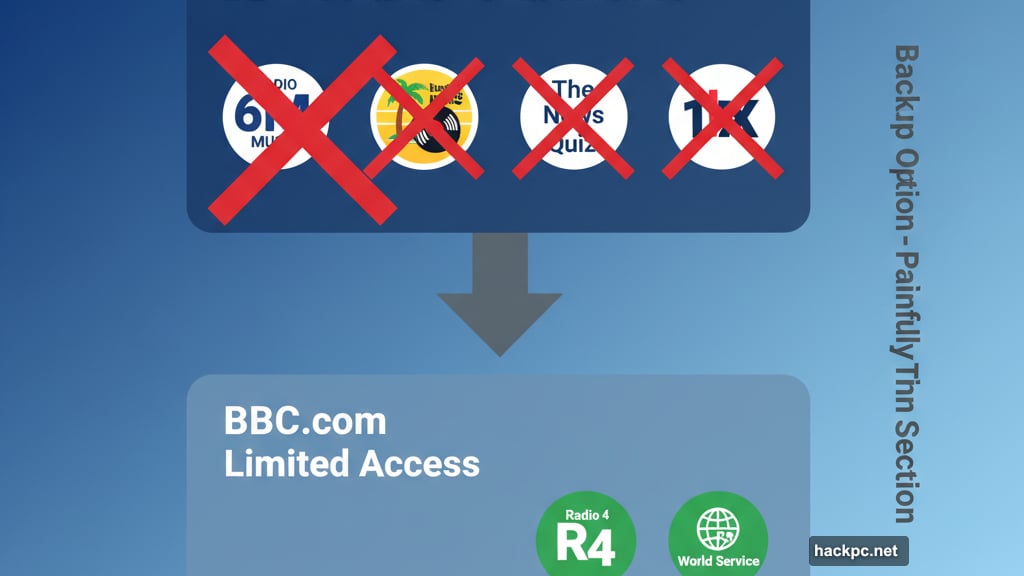
Irish politicians called it unacceptable. Cultural organizations condemned it. But the BBC stayed silent.
Why This Matters More Than You Think
BBC Sounds wasn’t just entertainment. For Brits abroad, it was a connection to home. For Irish listeners, it was a cultural bridge.
Musicians built entire careers on BBC radio play. Artists found audiences through BBC podcasts. Performers relied on BBC platforms to reach listeners.
Plus, the BBC provides something commercial radio can’t. Educational programming. Unbiased news. Cultural content that doesn’t chase advertising revenue.
Cutting international access didn’t just anger expatriates. It damaged the BBC’s cultural mission and betrayed its public service mandate.
The corporation made this decision without consulting listeners. Without explaining their reasoning. Without considering the consequences.
That’s what stings most. Not the block itself, but the complete disregard for the millions of people who depended on BBC Sounds every day.
Your best option remains clear. Get a VPN. Connect to a UK server. Keep listening like nothing changed. Because the BBC might have blocked international access, but they can’t actually stop you from tuning in.
Post Title:
Meta Description:
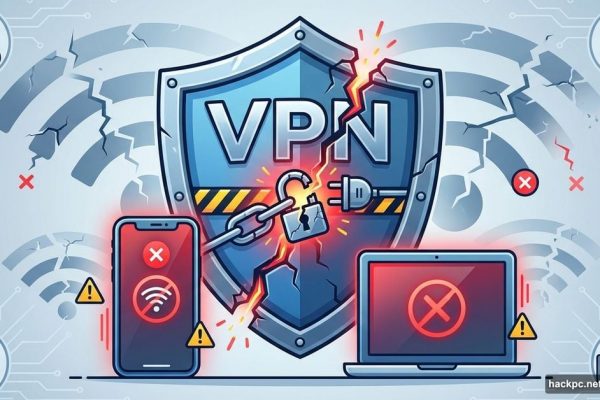


Comments (0)